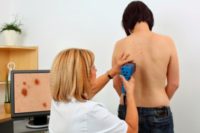It’s "Don't Fry Day"
Holiday weekend kicks off with reminder of skin cancer prevention

As warm weather approaches and millions of Americans prepare to enjoy the great outdoors, the risk for ultraviolet (UV) damage of the skin increases. Skin cancer is on the rise in the United States, and the American Cancer Society estimates that one American dies every hour from skin cancer. This year alone in the U.S., there will be more than 73,870 new cases of malignant melanoma, the most serious form of skin cancer, and more than two million new cases of basal cell and squamous cell skin cancers.
No single step
To help reduce rising rates of skin cancer from overexposure to the ultraviolet (UV) rays of the sun, the National Council on Skin Cancer Prevention has designated today -- the Friday before Memorial Day -- as “Don’t Fry Day,” to encourage sun safety awareness and to remind everyone to protect their skin while enjoying the outdoors. Because no single step can fully protect you and your family from overexposure to UV radiation, follow as many of the following tips as possible:
- Do not burn or tan
- Seek shade
- Wear sun-protective clothing
- Generously apply sunscreen
- Use extra caution near water, snow, and sand
- Get Vitamin D safely
Slip! Slop! Slap!
Remember to Slip! Slop! Slap!...and Wrap when you’re outdoors — slip on a shirt, slop on broad spectrum sunscreen of SPF 30 or higher, slap on a wide-brimmed hat, and wrap on sunglasses. The best way to detect skin cancer early is to examine your skin regularly and recognize changes in moles and skin growths.
Most skin cancers are caused by overexposure to UV radiation. Individuals with lighter-toned skin are more susceptible to UV damage, although people of all races and ethnicities can be at risk for skin cancer. Those who have a family history of skin cancer, plenty of moles or freckles, or a history of severe sunburns early in life are at a higher risk of skin cancer as well. To minimize the harmful effects of excessive and unprotected sun exposure, protection from intense UV radiation should be a life-long practice for everyone.
Fortunately, skin cancer is highly curable if found early enough.
Looking for a reprint of this article?
From high-res PDFs to custom plaques, order your copy today!




